- Home
- Tony Hillerman
Skeleton Man Page 3
Skeleton Man Read online
Page 3
“Well,” Plymale said, and put the résumé back into its folder and the folder back into the briefcase. “Time now to tell you what you’d be dealing with here. But first let’s enjoy the beach a little. Trot on out there in the surf a ways. Take a few minutes to take a swim and cool off.”
Chandler got up, grinning at Plymale. “You’d like me to trot out deep enough to get these swimming trunks soaked, just in case I have one of those high-tech recorder devices wired under them.”
Plymale smiled. “Good to be cool, too,” he said.
And it was good, Chandler noticed a little later as he sat in his wet trunks listening to Plymale’s explanation of the situation. Plymale’s law firm, he said, was representing a foundation that was the heir of the Clarke estate. Unfortunately, Clarke had provided in his will that if his sole offspring survived him, or produced any direct descendants who survived, then he, or they, would inherit instead of the foundation.
“No widow?”
“She was long dead,” Plymale said. “And as it happened, this ‘sole offspring’ was John Clarke. When his daddy heard John was missing in that plane crash, he had a stroke. Died while they were hunting for survivors. No known Clarke offsprings, so our foundation inherited a hell of a lot of wealth. Actually billions, counting real estate and securities.”
“Sounds simple enough,” Chandler said.
“It was. But it didn’t stay simple. A woman turns up, files a civil suit claiming she is the common-law wife of the old man’s son, and she’s pregnant, and her baby is going to be Clarke’s direct descendant. Claims this baby will be old Clarke’s grandchild. She wants the fortune for her kid. You with me so far?”
“I think so,” Chandler said. “But I don’t think I’d want to be her lawyer. And how does this diamond you mentioned come into it?”
Plymale sipped his drink. “If you want to hear this, be patient. Otherwise I call my driver and give you a ride back to my plane. What’s your choice?”
“Sorry,” Chandler said.
“This woman had a bundle of love letters from Old Man Clarke’s kid. The handwriting matched John Clarke’s, according to the experts. All are addressed to the claimant. They express joy at their impending marriage, and make some undisguised reference to their previous sexual encounters. In the last of those letters, he says he’ll be flying home from Los Angeles the next day and he’s bringing her a wonderful diamond engagement ring, and they’ll have a fancy wedding. Get married before the kid arrives.”
Plymale took another sip.
Chandler raised his eyebrows.
“He knew he had a kid coming, it seems,” Plymale said. “He was going to make it legitimate. Luckily for our Plymale law firm, he just waited too long. Then he got on the wrong airplane.”
“So they didn’t make the fornication legal, did they? Or you wouldn’t need me to find that wonderful diamond. Am I right?”
“Partly right. John Clarke got on Trans World Airlines Flight 2 at Los Angeles International Airport. Flight 2 took off at nine A.M. en route to Kansas City, then on to New York. The potential bride claims that she waited for him at the airport. Waited and waited and waited, with a roomful of other nervous people. Finally, the TWA folks announced the plane was missing. Advised them to leave a telephone number at the desk and go home and wait in comfort. Promised to call when the plane was located.”
“Let’s see,” Chandler said. “Was that about when hijacking airplanes was very popular? Did the plane turn up in Cuba?”
“The crash was in June 1956. Way too early for Castro and all that.”
“Oh.”
“It was a Lockheed Super Constellation. You old enough to remember them? Four prop engines and a tail with three rudders sticking up. A day later they spotted that funny-looking tail in Arizona, down in the Grand Canyon, and what was left of the cabin upstream a quarter mile or so. And the rest of it scattered here and there up and down the cliffs.”
“So you’re telling me Clarke was killed then, I guess, but the diamond not found on his body? Is that it? What happened to the Constellation? Struck by lightning or what?”
“Struck by a United Airlines Douglas DC7. That one had left Los Angeles about five minutes earlier, both of them flying at about twenty-one thousand feet, both headed to the East Coast. Storms all around. Nobody knows how it happened, but the investigators guess one of the pilots, maybe both of them, swerved to give the passengers a better look at the canyon. Anyway, a hundred twenty-eight people were killed. Everybody aboard the planes. Worst airline disaster in history up to that time. Bodies scattered up and down the cliffs, all torn up, some of them burned. The planes weren’t located until the next day. Then they couldn’t get the old-fashioned copters they had then into the canyon due to the canyon winds. Some medics were parachuted down, I’m told, and then they got some mountain climbers to help.”
Plymale stopped, peered at Chandler. “You never heard about this?”
“It was old news before I was born.”
“Well, back then it was the biggest story of the year.” Plymale chuckled. “Quite a show. Not many people flew those days. Took trains. And flying was expensive. One of the planes was mostly hauling serious big shots. A vice president of General Motors, for example, an ex-ambassador, CEO of another Fortune Five Hundred corporation, top level of the social class. Not just the tourist-ticket trash you see now. Very important families involved. One of them even hired some Swiss mountain climbers and had them flown over to see if his daughter’s body could be found. A week later they were still hunting pieces of the planes and trying to match body chunks. Hauled them out in bags, in bits and pieces.”
Plymale sipped. Chandler waited. Now the old bastard would finally get to the diamond. Probably he wasn’t going to ask any more about that homicidal mistake Chandler had made in Portland. Probably it was forgotten now. Even by that homicide detective. A cold, cold case. He sipped his drink. Enjoyed the breeze. Someday he’d be able to afford this lifestyle without putting up with this arrogant treatment.
“Luggage raining down, too,” Plymale said. “Suitcases, handbags, those little pet-carrier cages. They found one with a bulldog in it. One with a parrot. Scattering down like a sort of weird hailstorm.”
Plymale laughed, enjoying this. “Imagine that. I’d like to have seen it.”
“Clarke, too?”
“What?”
“Did John Clarke fall, too?”
“Now, that’s a dumb question,” Plymale said. “Everybody fell. Pilots, copilots, stewardesses, men, women, children, at least two babies. Some still in the planes, some doing a free fall.”
“Did he have the diamond he was bringing for his bride?”
“Probably. He said he was bringing it. He was on the plane when it left LAX. No way to get off.” He rattled what was left of the ice in his drink, looked at the glass, shook his head.
The old bastard is teasing me, Chandler thought. To hell with him. To hell with this.
“Look,” Chandler said. “I want to know about this job you brought me down here to tell me about. I guess you want me to find something. Maybe John Clarke is still alive. Maybe he didn’t get on that plane. Maybe you want me to find what’s left of his body if he was on it. Or am I looking for that remarkable diamond he was bringing his lady?”
“You’re not very good at guessing,” Plymale said. “Nor sitting still and listening.”
“Nor playing games, either,” Chandler said. “What do you want me to do? And what do I get out of it?”
“I want you to find John Clarke’s left arm,” Plymale said, and laughed. “How about that? And if you don’t find it, I want you to make damn sure nobody else finds it.”
Chandler considered this. He glanced at Plymale, who was grinning at him. He finished his drink, put on his sandals, pushed himself out of the chair, and looked down at Plymale.
Plymale’s grin went away. “If you walk off now, you’ll have been wasting my time and my money,” the old man sai
d. “I’ll have to find somebody else to do this. You’ll be back doing your nickel-and-dime skip-tracing jobs. Chasing after the bond jumpers. And you’ll be wondering what you missed.”
“Okay,” Chandler said. “Then tell me.”
“Clarke’s left arm seems to have been torn off. The wing of one of those planes cut through the passenger section of the other one. Maybe that did it. Or maybe when he was thrown out of the plane in the collision. Maybe when his body tumbled down a cliff.” Plymale shrugged. “Doesn’t matter how. What matters is that it was his left arm, because Clarke had one of those security cases attached to his left wrist. Handcuffed, sort of. Like the devices State Department couriers used to carry secret stuff. Jewelry dealers and some big-currency brokers used to use ’em, too. Lock them on, lock the case, nobody would have the second key but the person who was getting the delivery.”
“Sure,” Chandler said.
“Anyway, sometime after the disaster, a fellow working at the canyon bottom saw part of the arm—hand, wrist, forearm, pretty much all of it, I think it was. It was sticking out of a pile of driftwood and trash at one of those Colorado River waterfalls. He saw the forearm with the handcuff on it and the box attached to a chain. He even saw a tattoo on the bicep. Claimed he did, anyway. But he couldn’t get to it. Went back to the place the next day with some help, but the river had risen and swept away the flotsam. And the arm with it, or so we presume. Who knows? Could be somebody else came along and fished it out.”
“And got the diamond case?”
Plymale shook his head. “Maybe. Anyway, that’s the end of that phase of the story.”
“Why the security case?” Chandler asked. “He could have carried that diamond ring for his bride in his pocket.”
“Clarke was managing part of his old man’s jewelry business. He’d gone to the coast to bring back a shipment of ‘special-cut’ diamonds for the rich end of his trade. They were the very best, blue-white, perfect gems, specially cut for the cream of the elite. I think there was seventy-something of them listed in the claim, all at least two and a half carats. The airline insurance company paid its hundred-thousand maximum limit for the loss. People in the business guess they’d have been worth a hundred times that, even at prices then. Today, who knows. Smallest one would probably sell for more than twenty thousand. Say double that for an average, and then multiply it by about seventy-five. Many multiple millions.”
Chandler was no longer bored. Or tired.
“And they were never recovered?”
“Not legally, anyway. Not reported and returned to owner. That’s the problem,” Plymale said. “Maybe they have been. Maybe we’re trying to find who has them now.”
That didn’t make sense to Chandler. This old man was not going to be somebody he could trust, he thought. Ironic, he thought. Neither was he.
“It seems to me if somebody had found them, they’d have been cashed in by now,” Chandler said. “Don’t you think?”
“If they had been put on the market, we’d know about it. The Clarke family and the insurance company had the alert out to jewelry dealers. Here and in Europe and everywhere else. The DeBeers monopoly keeps an eye out, too, and those stones were rare enough at their price and that special cut so they’d have been noticed. And they haven’t been,” Plymale said.
He checked his empty glass, put it down, looked at Chandler. “Not until this one showed up in that robbery in New Mexico.”
“Oh? You going to tell me about that? Now we’re getting to the bottom line.” Chandler had been imagining finding that jewel container. Leather maybe, or some tough plastic. Zipper would be locked. He’d cut it open. Pour them out into his palm. One by one. Examine them. Estimate their worth.
“Arm hasn’t been found, either,” Plymale said.
Chandler laughed. “Who cares about that damned arm?”
“I do. A lot. And I think you will, too, if you want this job,” Plymale said. He studied Chandler, waiting for Chandler to ask him why.
“Why?”
“Those diamonds are just a chance to make some walking-around money on the side,” Plymale said. “Just peanuts. But the arm is what’s important.”
Chandler’s expression was puzzled. No need to fake it.
“This woman Clarke was coming home to marry, her daughter is into that psychic stuff. Or claims she is. Crystal gazing, pyramid power, all that flaky stuff. At least that’s what we hear. Her name’s Joanna Craig. Lives in New York. She’s been running some little ads out in Grand Canyon country, spreading the word among National Park guides, tour directors, so forth, that there’s a hundred-thousand-dollar reward for that arm.”
“Well, now,” Chandler said. “Do you know why?”
“We are told that she claims she has received a psychic message from young Clarke from beyond the grave. In this dream she claims this Clarke ghost tells her his missing arm is hurting him. He tells her she’s his daughter and she must find that arm of his and get it buried with the rest of him.”
Chandler noticed he was smiling.
“That’s her story,” Plymale said. “Trouble is most of those bodies were so torn up that they couldn’t be collected and put back together. Some burned to ashes, some eaten by the coyotes before they were found, a lot of the bits and pieces buried together in common graves. How would you like to go into court with that sort of evidence?”
Chandler grinned. “So we dig us up another set of left-arm bones and collect the reward. But I bet you already thought of that.”
“Of course,” Plymale said. “You’re not as slow as you’ve been acting. Of course, it wouldn’t work. According to the ad she ran, he had a fracture of that forearm set a few years earlier. X-rays and so forth. Had to be pinned together. You couldn’t get away with it.”
“Oh, well,” Chandler said, thinking of the diamonds again. “Just tell me what you’re after. And what you want me to do. And what’s in it for Bradford Chandler.”
“Were you paying attention when I mentioned that civil law suit? Well, pay attention now. This gets complicated. Old Man Clarke was a widower. No near kin except his son, John. In the suit Joanna’s mother filed way back then, she claimed this Joanna was the baby John Clarke got her pregnant with. That makes Joanna Craig a granddaughter of John Clarke’s daddy. That makes her the ‘direct descendant’ who inherits the family fortune.”
Chandler looked at Plymale, said, “Light begins to dawn. Need I ask who has all that Clarke fortune now?”
“The way the will was written, if there weren’t any of those direct descendants, then the money went to this nonprofit charity foundation we helped him set up. I think I explained that.”
“Ah,” Chandler said. “And you were the executor of his estate?”
Plymale ignored the question. “Joanna Craig’s mother-to-be got herself a lawyer, but the only evidence she had was a bundle of old letters. It was too weak to back up a court claim. We tried to make a settlement with her. She turned that down and that looked like the end of it.”
“She sounds crazy,” Chandler said.
“She was crazy. Old Man Clarke said she was schizophrenic-paranoid. Seemed sane enough when she was taking whatever medicine the shrinks give ’em for that. But crazy, anyway.”
Plymale paused, signaled for another drink. Waited. Chandler looked out across the beach at the surf coming in, at the girl in the string bikini, who was coming back now, accompanied by another bikini-clad girl. They were looking his way, laughing.
The drink arrived. Plymale took a sip. Poked Chandler’s arm. “Pay attention now,” he said. “Here’s why we give a damn about finding that arm. Those damned scientists now claim they can recover DNA evidence from old bones. Even awful old bones, like in the Egyptian pyramids. You know what that means?”
Chandler nodded, but Plymale told him anyway. It meant that John Clarke’s lost left-arm bones with the old fracture x-rays and maybe even with the diamond case still handcuffed to the wrist could prove that Joanna
Craig actually was the man’s daughter.
And, Chandler was thinking, that would mean that old man Plymale would lose control of a huge amount of money. Maybe there would be an outcome even worse than that for Plymale. The court might order Plymale to account for what his “nonprofit charity” had been doing with that mountain of money all the years he had controlled it.
Chandler was staring at the two girls in the bikinis, but his mind was focused on that mountain of wealth.
5
Within minutes after getting home from his meeting with Pinto, Leaphorn knew this worrying about diamonds wouldn’t just go away. The light on his answering machine was blinking and the second call was from Deputy Sheriff Cowboy Dashee. With a diamond on his mind.
The first one was from Professor Louisa Bourbonette, sounding happy. The old woman she’d gone to see at Bitter Springs had been a treasury of Havasupai legendary stuff. Tomorrow the old lady would take Louisa to see an even more elderly uncle who was full of lore about the Paiute people.
“I’m going to stay down here tonight. Tomorrow I’ll find this fellow and see what I can get on tape. I’ll call you again tomorrow and let you know when to expect me. I think it’s going to link the Havasupai origin story with the Hopi’s. Wish you were down here with me. You’d be interested in these legends. And don’t forget tomorrow is garbage pickup day on your street.”
Joe hadn’t forgotten. He’d already wheeled the can out to the curb for the Window Rock Trash Co. truck.
The second call was the sort that retired people learn to expect.
“Lieutenant,” Dashee said, “two of your former hired hands have set themselves a getting-married date. It’s going to be two weeks from Monday, at Bernie Manuelito’s mother’s place, south of Shiprock. You’re invited. I get to be best man. In case you haven’t guessed, Bernie’s chosen one is finally, at long last, Jim Chee.”
Then came Cowboy Dashee’s chuckle, followed by a short pause, and then it was time for what retired people know follows friendly introductory statements:

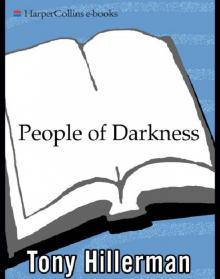 People of Darkness
People of Darkness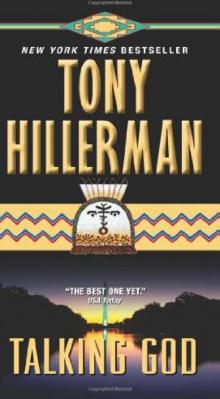 Talking God jlajc-9
Talking God jlajc-9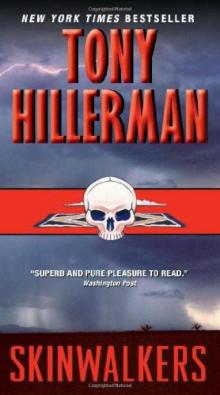 Skinwalkers jlajc-7
Skinwalkers jlajc-7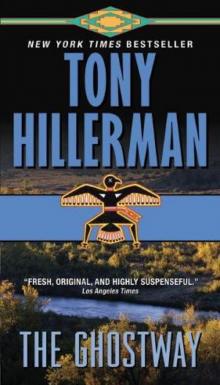 The Ghostway jlajc-6
The Ghostway jlajc-6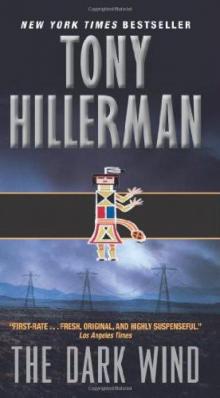 The Dark Wind jlajc-5
The Dark Wind jlajc-5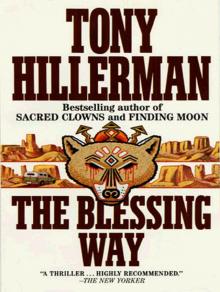 The Blessing Way
The Blessing Way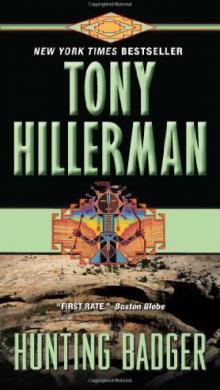 Hunting Badger jlajc-14
Hunting Badger jlajc-14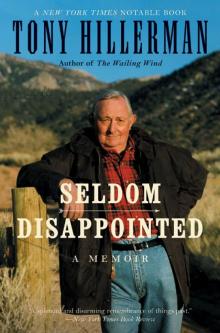 Seldom Disappointed: A Memoir
Seldom Disappointed: A Memoir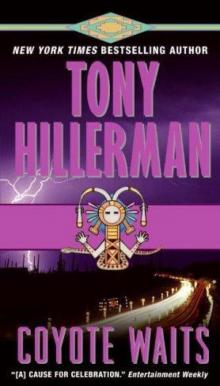 Coyote Waits jlajc-10
Coyote Waits jlajc-10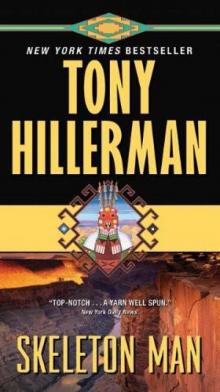 Skeleton Man jlajc-17
Skeleton Man jlajc-17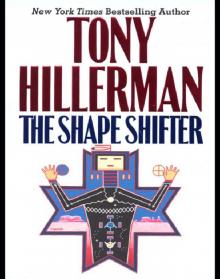 The Shape Shifter
The Shape Shifter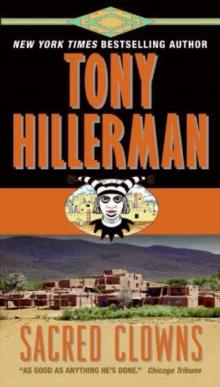 Sacred Clowns jlajc-11
Sacred Clowns jlajc-11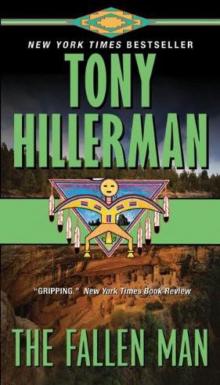 The Fallen Man jlajc-12
The Fallen Man jlajc-12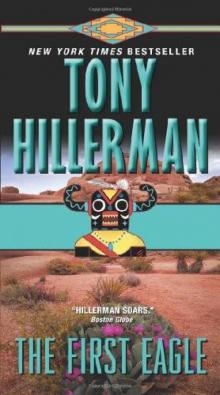 The First Eagle jlajc-13
The First Eagle jlajc-13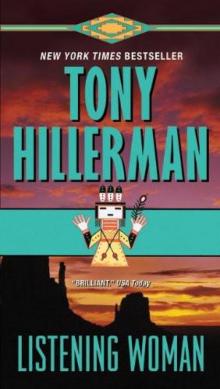 Listening Woman jlajc-3
Listening Woman jlajc-3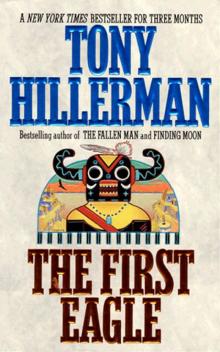 The First Eagle
The First Eagle Skeleton Man
Skeleton Man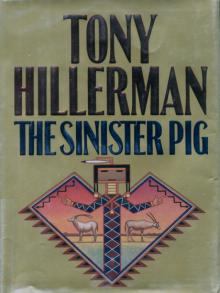 The Sinister Pig jlajc-16
The Sinister Pig jlajc-16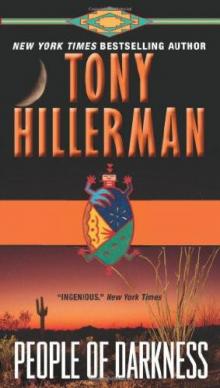 People of Darkness jlajc-4
People of Darkness jlajc-4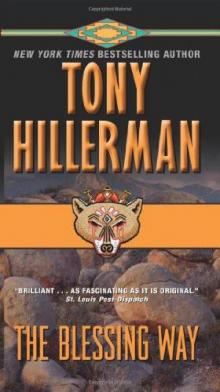 The Blessing Way jlajc-1
The Blessing Way jlajc-1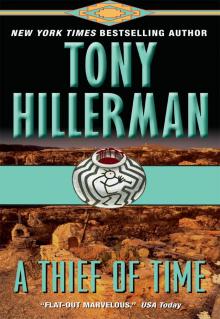 A Thief of Time
A Thief of Time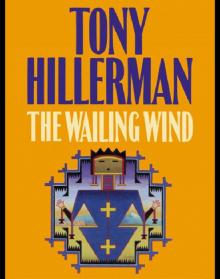 The Wailing Wind
The Wailing Wind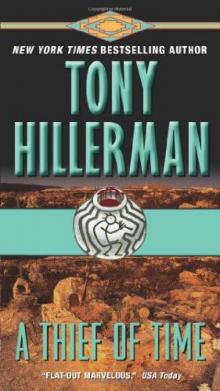 A Thief of Time jlajc-8
A Thief of Time jlajc-8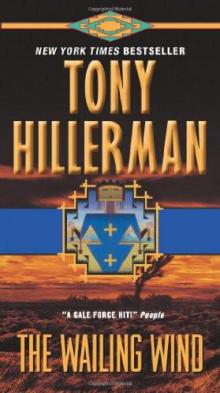 The Wailing Wind jlajc-15
The Wailing Wind jlajc-15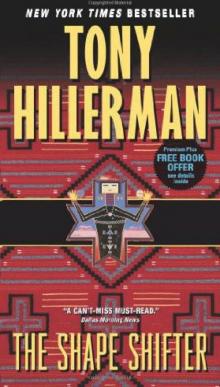 The Shape Shifter jlajc-18
The Shape Shifter jlajc-18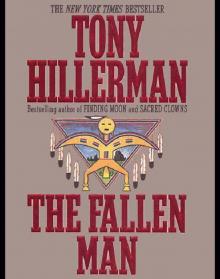 The Fallen Man
The Fallen Man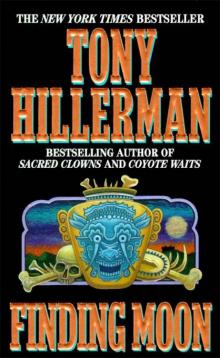 Finding Moon
Finding Moon